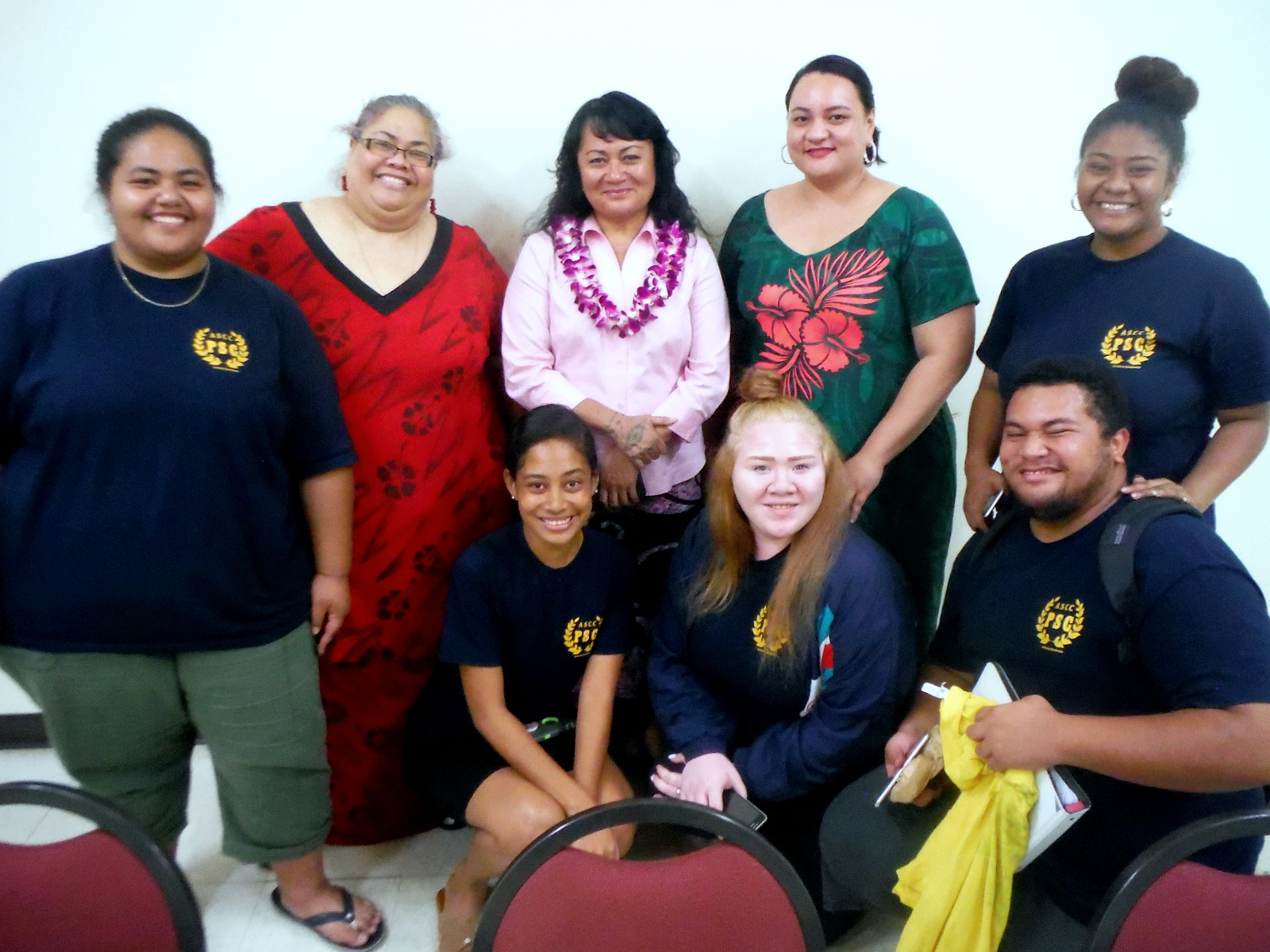Mrs. Sandra King-Young (top, center), Director of the local Medicaid Office and Parliamentarian of the American Samoa
Democratic Party, spoke to the ASCC Political Science Club earlier this month. Seen here with King-Young are instructors
Adrian Vasai-Moana (to her left) and Kayla Sauafea, along with club members. (Photo: J. Kneubuhl)
Mrs. Sandra King-Young (top, center), Director of the local Medicaid Office and
Parliamentarian of the American Samoa Democratic Party, spoke to the ASCC Political Science Club earlier this month. Seen
here with King-Young are instructors Adrian Vasai-Moana (to her left) and Kayla Sauafea, along with club members. (Photo:
J. Kneubuhl)
ASCC Political Science Club Guest
April 10, 2019
By James Kneubuhl, ASCC Press Officer
On Thursday April 4th, the American Samoa Community College (ASCC) Political Science Club welcomed Tofoitaufa Sandra King-Young as its Guest Speaker. The Director of the local Medicaid Office, Mrs King-Young also serves as the Parliamentarian of the American Samoa Democratic Party. In fall 2018, the PoliSci Club heard from the late Bishop Vaifanua Mulitauaopele of the local Republican Party, so this semester they invited a representative from opposite party to speak.
King-Young began her talk by expressing the opinion that, especially these days, the distinction between Democratic and Republican values often becomes blurred. “It isn’t always about the party that one belongs to,” she explained. “People should really be concerned about what the issues are and what our government and leaders, regardless of which party they belong to, intend to do about them. What issues are most important to them? Ask yourself which issues are important to you, what individual government leaders plan to do to address these issues, what they have in mind for our future, and what they can do for the betterment of not just a few, but for all.”
Explaining her personal path into becoming a Democrat, King-Young recalled how she was raised in a staunch Republican household which reflected the political beliefs of her father, newspaper man the late Jake King, who published the Samoa News in the late 1960s and early 1970s. Her political views changed while working in Washington as an intern for the late Senator Fofogaosamoa Daniel K. Inouye (D- HI), who was influential in her becoming a Democrat. “Senator Inouye fought hard on behalf of Native Americans, Native Hawaiians, American Samoans and other indigenous people of the US Pacific territories,” remembered King-Young, “and learning this man’s views and philosophies is one way I began to truly comprehend the fundamental differences between Republicans and Democrats.” King-Young advised any students seriously interested in a career in politics and government, if possible, to work in the nation’s capital of Washington D.C and experience the workings of the US political system up close.
King-Young shared her experiences of being a Democrat, covering the values of the Democratic Party and its stance on issues she feels most concerned with, such as climate change, education and health care. She also cited the long record of Democrats fostering policies to benefit minorities, the disabled, the elderly, and others who face challenges. “Based on my experience,” King-Young said, “the Democrats have more of an agenda that involves caring for people—including the people of American Samoa. For example, the Republicans are trying to get rid of Medicaid, and if that goes away, American Samoa will not have a health care system. We will be in big trouble.”
King-Young emphasized to the PoliSci Club students the importance of political participation, especially voting. “Your vote is your voice in government,” she reminded the audience. “The people choose the government leaders who serve. Therefore, we must make sure to vote and make wise decisions individually when doing so. We have to also ensure that our leaders are accountable for the decisions they make on our behalf.”
During the question-and-answer portion of King-Young’s talk, PoliSci Club Secretary Tofiga Tufele asked if and how political parties influence our local government. King- Young responded that politics in American Samoa is not only different, but “harder to play” than American politics. “It is very unpredictable at times,” she said, “and on a local level, other factors usually come into play besides anyone’s allegiance to an American political party.” Club President Darius Maua asked whether having a matai title really has to be a requirement for leaders in local government. “At first, I didn’t believe that having a title was relevant to a western-modeled process of government,” King-Young answered, “but over time I’ve grown to appreciate why our ancestors insisted on the inclusion of the matai system in our local government. In my opinion, at this time, it would be best to leave our system as it is. We can certainly work to improve our system and try to ensure more accountability, but I feel that to entirely discard it would definitely be wrong for us.”
Following King-Young’s talk, the officers of the Poli-Sci Club presented their guest with commemorative gifts such as her very own official club t-shirt. On behalf of Social Science Department chairperson Lilian Temese and fellow instructor Adrian Vasai Moana, Social Science instructor Kayla Sauafea thanked King-Young for taking the time to share her time and experience with the club.
The ASCC Political Science Club is a student organization under the aegis of the Social Science Department. The club is focused on fostering and expanding the interests and pursuits of students in government and politics. In doing so, the club organizes discussions, forums, and special events that give students the opportunity to learn about current political issues in our government, public policies, social institutions, and the participants in our political community. For more information on Social Science courses at ASCC, see the College’s official Catalog, available online at: www.amsamoa.edu.

